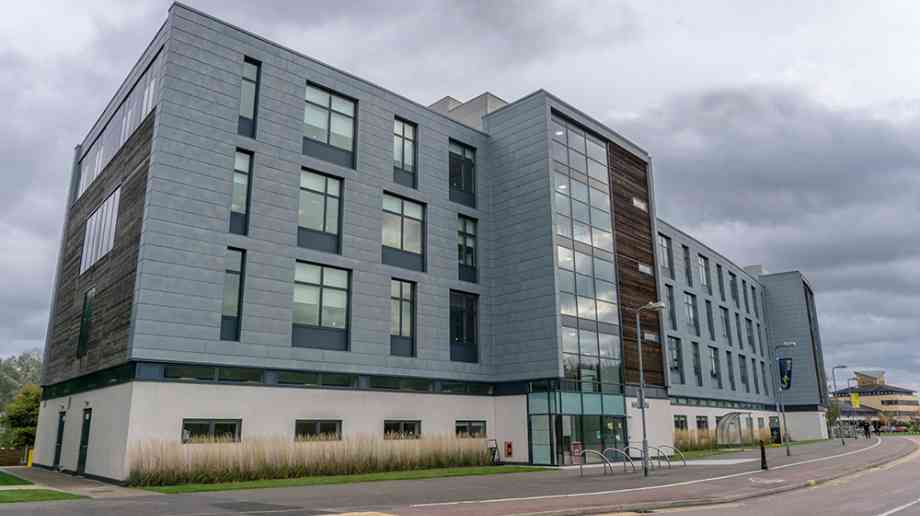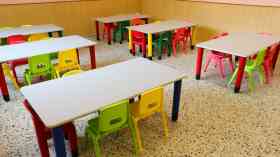
Net-zero learning environments
Schools built under the School Rebuilding Programme are to be net-zero in operation and resilient to climate risks. So what does this mean? And what can we learn from the first net-zero school to be completed under the programme?
The government’s school rebuilding programme (SRP) carries out major rebuilding and refurbishment projects at school and sixth-form college buildings across England, with buildings prioritised according to their condition.
Launched in 2020, the scheme aims for 500 schools to benefit from the programme over the decade.
In December 2022, it was announced that 239 new school buildings schools and sixth forms will benefit from renovation projects.
The new projects build on the 161 that had previously been announced, with construction works now nearing completion on the most advanced sites.
It means in total 400 out of the 500 schools and sixth forms have now been selected for rebuilds.
What schools get prioritised?
Schools are prioritised if they have buildings of specific construction types that require replacement, or if their buildings have the highest condition need, identified in data collected in the Condition Data Collection (CDC). Schools are also prioritised if their buildings have severe and urgent condition need or if their buildings have risks that have the potential to cause significant harm to pupils and staff.
The 300 schools prioritised in 2022 were identified from 1,105 nominations received in early 2022, from organisations responsible for school estates. Assessment and site visits took place in spring and summer 2022 to identify those schools with the greatest need for a rebuild or significant refurbishment.
What will be different?
All projects in the School Rebuilding Programme are built to the latest construction standards, resilient to climate risks, net-zero in operation, and include modern facilities.
The DfE’s sustainability strategy for schools wants young people to learn in buildings designed for net zero and says that “seeing sustainability brought to life in the buildings around them will allow children and young people to gain experiences which will enhance and contextualise their learning.”
The strategy says that adapting existing buildings and designing new ones to respond to climate change and reduce emissions will undoubtedly be a significant challenge.
For new buildings, such as those selected, through the School Rebuilding Programme, specifications will set out low-carbon, climate-resilient standards – such as the installation of heat pumps for energy efficiency. For existing buildings, the challenge will be greater and the DfE will need to get a better understanding of the scale of the problem
When designing net zero buildings, the World Green Build Council says that a whole life carbon approach should be taken, which addresses emissions from operational energy use in buildings, and the embodied carbon which comes from the building materials and construction or renovation processes.
Energy efficiency must be a top priority, and the energy used should come from renewable sources.
What’s more, any remaining carbon should be offset using a recognised offsetting framework, and the amount of offsets used should be publicly disclosed.
Resilient to climate risks
The DfE also wants schools to be resilient and adaptable to the risks caused by
climate change. The three highest priority risk areas identified in the Climate Change Committee Independent Assessment of UK Climate Risk were increased heat risk, flood risk, and water scarcity.
To this effect, the DfE aims to align strategic action with the Environment Agency’s National Flood and Coastal Erosion Risk Management Strategy to ensure education settings are ready for, and resilient to, flooding and coastal change.
The first net zero school
Littleborough Community Primary School in Rochdale, Greater Manchester, is the first net zero school completed under from the School Rebuilding Programme.
The project provides 14 new classrooms, a library, a new sports/assembly hall, Multi Use Games Area (MUGA) and a 420-place primary school providing 60 places for each year group along with a 26-place nursery.
Procured through the DfE’s Modern Methods of Construction framework, the school’s design from architects Wates maximises sustainability and ensures the building is Net Zero Carbon in Operation (NZCiO).
This includes an optimised thermal envelope with increased insulation and large, triple glazed windows to maximise daylight together with rooflights and lightwells, enhanced ventilation and Photovoltaic solar panels.
Construction started in September 2021 with all works carried out while the existing school was still in operation.
The project was celebrated with an event attended by delegates from across the delivery partnership, Rochdale Borough Council and the DfE.
Sarah Cooke, regional director for the Northwest at Wates, said: “Littleborough represents a step change in how schools are built, designed to not only provide brilliant, state-of-the-art learning facilities for pupils, but for the long-term benefit of the wider environment.”
Baroness Barran, Parliamentary Under-Secretary of State for the School System and Student Finance, said: “We’re thrilled to be celebrating the opening of the new net zero building at Littleborough Primary, a £10m School Rebuilding Project that started in Sept 2021 and will mean 14 new classrooms, a library, a new sports hall and multi-use games area for the children and families in this area.
“This is the first entirely new building to have been completed and opened as part of the Government’s Schools Rebuilding Programme, which will see 500 schools across the country benefit from new and renovated energy efficient school buildings that local communities can be proud of.”
Louise Woodman, head teacher at Littleborough Community Primary School, said: “We are delighted with our new building and it completes the improvement programme that has been taking place for a couple of years.
“The children absolutely love the modern facilities and can’t wait to be in the new classrooms and use the new library and multi-use games area.”
“Councillor Rachel Massey, Rochdale Borough Council’s cabinet member for children’s services and education, added: “We are immensely proud that the borough of Rochdale is leading the way in this national programme and Littleborough Community Primary School is the first Net Zero school to be completed as part of the rebuilding programme.
“What’s most important is the new environment provides our children with the best possible environment for learning and it is also a real asset to the local community.”
Littleborough is the first project to be completed as part of the initial tranche of Net Zero schools in the DfE’s School Rebuilding Programme, which will see Wates delivering an additional two projects at Lytham St Annes High School and Whitworth Community High School. Wates also recently completed its first project procured through the MMC framework, Edgar Wood Academy, in Middleton.
Projects in progress
Wates is also working on Lytham St Annes High School and Whitworth Community High School as part of the Schools Rebuilding Programme.
Lytham St Annes High School in Lancashire will have a new two-storey main school block and detached sports hall. All new build elements will be net-zero carbon in operation, achieved through a combination of enhanced building fabric, passive ventilation chimneys, mechanical heat recovery systems and on site offsetting of energy use through an extensive biosolar roof system.
Whitworth Community High School in Lancashire will have a new 750-place secondary school, comprising of a two and three-storey main teaching block with classrooms, main hall, and specialist technology spaces. A minimum of 70 per cent of the building’s PMV (pre-manufactured value) will be constructed using offsite manufacturing techniques, while other sustainable aspects of the build will feature roof-mounted photovoltaics, biosolar green roofs, heat recovery systems, sustainable drainage systems, offsite engineered thermal envelope and electrical car charging points.
Further Information:
Latest News
19/12/2025 - 09:54
The Education Committee has expanded its ongoing inquiry into the early years sector to examine how safeguarding can be strengthened in early years settings.
18/12/2025 - 09:25
The UK will be rejoining the Erasmus programme in 2027, following a package of agreements with the EU.
17/12/2025 - 09:31
Ofqual has fined exam board Pearson more than £2 million in total for serious breaches in three separate cases between 2019 and 2023 which collectively affected tens of thousands of students.
16/12/2025 - 09:19
The average funding rates will increase by 4.3% for under 2s, and by almost 5% for 3-and-4-year-olds.
15/12/2025 - 10:30
Local colleges are set to receive £570 million in government funding to expand training facilities in areas such as construction and engineering.







